In this edition
From the Director of Early Learning
Dear Families,
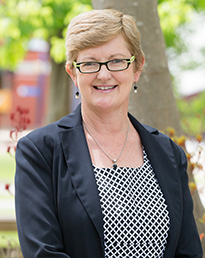
We are excited to commence the second semester of our school year with new families joining our Centre and existing families returning. We hope that you enjoy reading our fortnightly newsletters which will share snapshots of happenings in our ELC community.
Please do not hesitate to contact me if you require any assistance or additional information.
Learning at its best
There is always so much to learn; as children and as adults. The part of my job that I love the most is being an active lifelong learner. You never have all of the information or know everything and must be continually reflecting to set new goals, to ask more questions and develop your critical lens.
At our ELC we are very engaged in Professional Learning. One of the best aspects of our ongoing learning is the learning community that we have created around us. Learning in a collaborative way empowers others and enhances the opportunities for us to see things from different viewpoints and to shift our thinking. Trust is critical and it is with this trust that we can try new things and make changes.
During the holidays the teaching team attended a significant conference in Sydney entitled ‘Landscapes of Identity’ with international speakers from Reggio Emilia. Over the days of the conference we were challenged to think beyond our existing position by the points of view of others. Together we had much of our existing practice confirmed but the thinking more deeply about certain elements really helped us to move to that next step. Together we modelled what a learning community should and can be and were very appreciative of this unique opportunity to be together, hearing the same information and then being able to have dialogue about it.
We are going to present our learning to our entire ELC staff and are already using some of the ideas to expand our skill set in ‘Planning for the Possible’, incorporating the Primary Years Programme and Early Years Learning Framework into this.
You may already think that the teaching and learning at the ELC is of high quality however it is our responsibility to ensure we are not stagnant. We do not roll out the same thinking, the same learning and the same ideas year after year. Our work is evolutionary and this is because we put the significance of the child first, who they are, what stories they have to tell us, what skills they already have that can be shared with us; we give value to all of these things and it is the child that after all guides us on our learning pathway.
We hope to be able to share with you how this is possible and how the child can inform our practice on so many levels.
We look forward to an exciting term ahead!
Kate Mount
Director of Early Learning
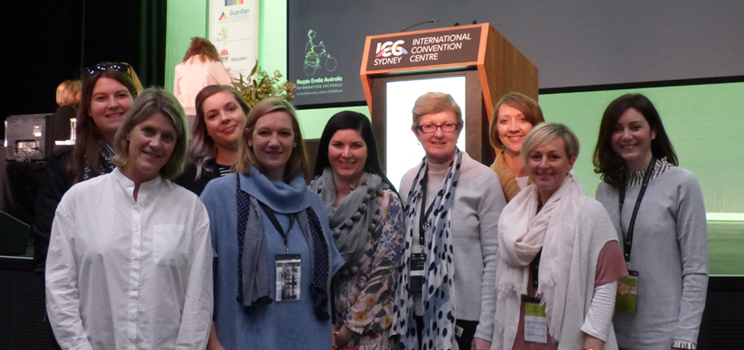
Welcome to Term 3 morning tea
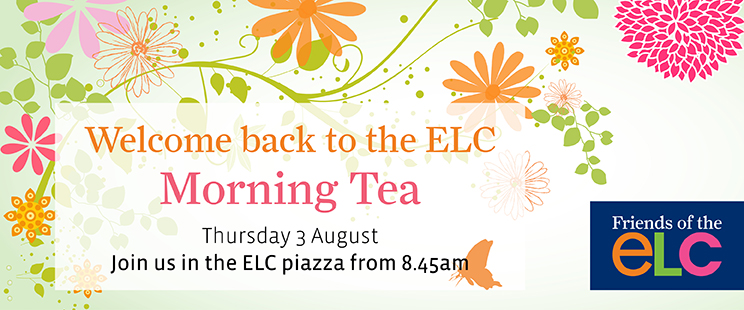
Join us for morning tea!
To commence the term, the Friends of the ELC will host a welcome morning tea. It will provide an opportunity for you to socialise with other families within our ELC community.
TOMORROW 3 August from 8.45am
ELC piazza, St Peter’s Girls’ School
We look forward to enjoying your company at this informal catch up.
Save the Date
Wellbeing in younger children
30 August Dr Tom Nehmy evening seminar for ELC – Year 4 parents
31 August Dr Tom Nehmy morning workshop for ELC – Year 4 parents
Reception for 2018 Receptions
4 September Twilight Tour of the Junior School
Notice to our wonderful grandparents and special friends
Afternoon Tea
Wednesday 13 September at 2pm
Term 3 Dates to Remember
3 August Welcome back morning tea at 8.45am
14 August Stonyfell Room Information Night (for new families)
30 August Father’s Day Breakfast at 7.45am
30 August Dr Tom Nehmy evening wellbeing seminar for ELC – Year 4 parents
31 August Dr Tom Nehmy morning wellbeing workshop for ELC – Year 4 parents
13 September Grandparents and special friends afternoon tea at 2pm
4 September Twilight Tour of the Junior School for families of 2018 Receptions
18 – 20 September ELC Parent Teacher Conversations
Worm Farm Initiative
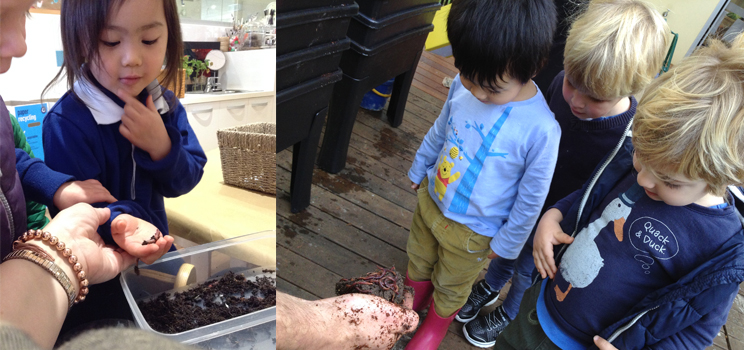
The St Peter’s Girls’ Early Learners’ Centre is excited to announce the launch of our new worm farms which were set up during mid-semester vacation care alongside the children. Situated in each of the four rooms, these worm farms will be run side-by-side by both the educators and the children in hopes to form our own ecological identity and become a more sustainable ELC by reducing our Centre’s carbon footprint.
Did you know that as organic waste decomposes in landfill, it produces the greenhouse gas called methane? This gas is 24 times more damaging to our environment than carbon dioxide (Clean Up Australia, 2009).
Our worms will live off the organic food waste we produce at snack and meal times, along with a fraction of our paper recycling, so that we can cut down the amount of organic waste we send off to landfill each day. In return, our worms will leave us with beautiful fertiliser and a soil supplement for all our plants and gardens here at the ELC!
These worms could not come at a better time here in the Centre as they fit perfectly with the term/semester’s Primary Years Programme (PYP) inquiry focused at forming an ecological identity and developing personal connections to our natural world.
By exposing the children to sustainable thinking throughout our daily practices, we will endeavour to build a stronger ecological identity together and show children how their actions can have a direct impact on their planet.
The children have already shown a great interest in the establishment of these worm farms and we cannot wait to see where this leads.
We are always looking to make deep connections with families and communities beyond what goes on inside the Centre, and so we invite you to come take a look at our friendly worms yourselves and say hello! If you would like to help out or get involved, our worms love to eat old newspapers that you might have lying around the house, so by all means bring them in! Or, if you would like any more information on these farms, please do not hesitate to come and talk to myself or Annabelle Redmond as we would love to help.
Worm Farming Fact Sheet:
https://www.cleanup.org.au/PDF/au/cua_wormfarming_fact_sheet.pdf.
Henrietta Balnaves
ELC Co-Educator
‘Old Scholars’ of the ELC
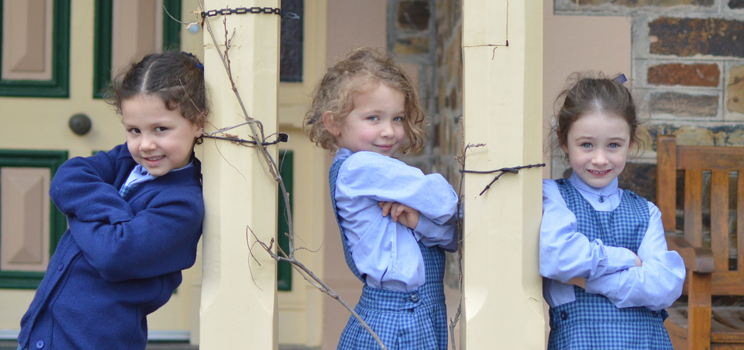
Late last term amongst many of their Hallett Room friends, Violet, Gabriella and Phoebe attended the ELC Hat Ceremony in the Arts Centre. It is a significant occasion for ELC students graduating to the ‘big school’. The girls were presented with their new school bag and St Peter’s Girls summer straw hat. On Tuesday 25 July, Violet, Gabriella and Phoebe joined 17 classmates in the Mid-Year Reception class. We thought it would be nice to revisit them as new ‘Old Scholars’ of the ELC, and find out what they have been up to since moving across the lawn!
The girls proudly said they had been at school six days, which is something they have been counting as a class. Gabriella mentioned that reading books was her favourite activity. Amazingly, the girls have also been learning not just French, but Chinese too! Some of the class have been attending piano, violin and cello lessons, and they have also explored the library and borrowed books.
There’s been a focus on learning the rules and procedures of school life, developing their individual IB Learner Profiles, learning their Jolly Phonics sounds as well as practising their letter formation. It’s not all hard work though, as last week they had an absolute ball visiting the ELC and saying hello to their friends!
The ‘Old Scholars’ of the ELC have definitely settled in well to life at St Peter’s Girls, and we look forward to checking in regularly to see how they are all going!
News from the Stonyfell Room
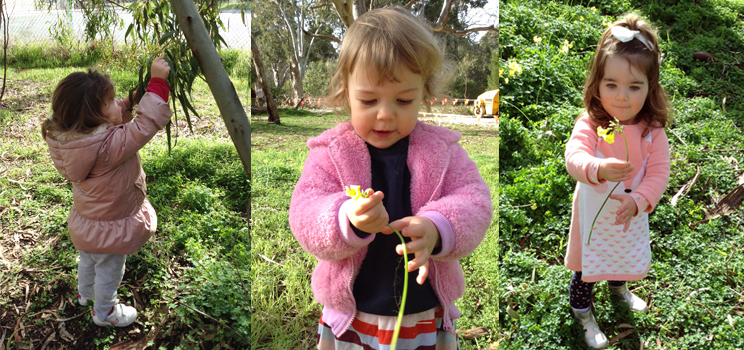
Welcome everyone to Term 3. The Stonyfell team is very excited to be commencing this term together and would like to take this opportunity to welcome all new families into our community. Our fortnightly newsletter is one of the many ways that we are able to keep you informed about what we are exploring and investigating in the Stonyfell Room and across the ELC.
Every term the teachers work together to develop an inquiry focus that will drive our learning for the term. This inquiry is supported by the Primary Years Program (PYP) curriculum that is used as part of the International Baccalaureate (IB) across the whole School. This term our Central Idea is:
People have an impact on the world
The direction we are planning to take through this inquiry is to develop a deeper connection to our natural world. As the term progresses we will be working in collaboration with the children to design an action that we can take which will impact our world.
We have planned to use Ferguson Park, the nature reserve that borders our Centre, on a regular basis. We will be inviting small groups of children to explore the park. During these visits we are interested in observing how the children interact and connect with this space. We will see how they use their observational skills to develop their connections to the natural world.
In conjunction with our visits to Ferguson Park we are also engaging the children in exploring and learning about our worm farms. These were set up during our Vacation Care Program with the assistance of our Property Services team. We are currently learning how to look after the worms and finding out what they need. We hope to eventually be able to use the natural ‘worm tea’ they produce in our garden as a fertiliser.
Through these explorations, we will be focusing on developing the children’s ‘ecological identity’. This term can be defined as:
“Inviting children into a relationship with the world beyond walls, and with the creatures that live there. We invite them into ethical thinking anchored by the compassion that comes from caring and engaging relationships.”
A. Pelo- The Goodness of Rain, p. 44
We believe that the development of our ecological identity can have an impact on our understanding of empathy and that we can learn to not only empathise with others but to empathise with the natural world and all that lives in it.
Laura Reiters
News from the Bell Yett Room
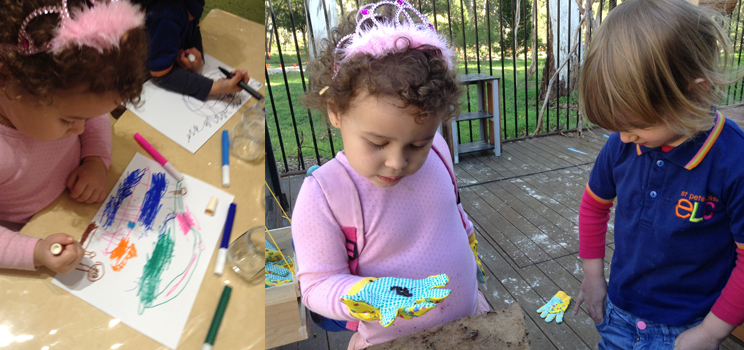
A big welcome to Term 3 in the Bell Yett Room. We have had a wonderful start to the term with our new children settling in exceptionally well. This smooth transition has been supported by intentional visits to the Bell Yett Room during Term 2 and Vacation Care, continuity of staff across the holiday period, the transparency our physical environment provides and, last but not least, the support our existing children have provided in the caring and thoughtful way they have embraced our new friends and supported them in their new environment.
We are very excited about our overarching inquiry this term. The central idea we are exploring with the children is, ‘People can have an impact on our world’. Our intention through this investigation is for our learning community (children, families and educators) to develop an ecological identity as we form personal connections to our natural world. This will be underpinned by embedding Indigenous perspectives and sustainable thinking in our daily practices.
You can read more about the background to our inquiry and keep up-to-date on our explorations by visiting our Bell Yett Canvas Page.
The children have begun meeting the newest addition to the ELC – the worms in our worm farm. We believe that for the children to develop sustainable understandings, they need to engage not only their minds, but their bodies and hearts with the learning context.
Last week I invited some children to visit the worm farm. This was Nina-Lucia’s first introduction to the worm farm.
“There are worms! They are soooo cute! They are eating all the strawberries. Hello worms. But where is the farm? . . . The worms know.”
Elijah, who had visited the worms over the holidays told me:
“They always come to you when they see you. They love it when you come.”
We would appreciate hearing about some of the ways you and your children engage with your natural environment. We welcome you to send us an email, photographs or have a conversation with us about your children’s experiences.
Leanne Williams, Nell Tierney and the Bell Yett team
News from the Ferguson Room
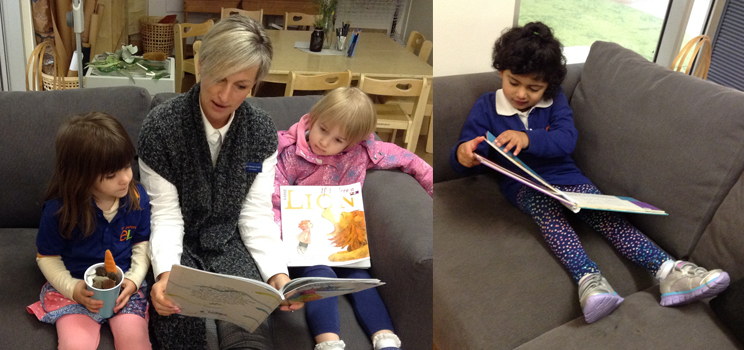
We have had a very smooth beginning to the term as we have welcomed and supported both new and ‘old’ friends. We are very proud of the children and the way they have made new connections.
Many of you have had questions about the pattern of our day and the experiences in which the children are engaged. However, if you have further questions about anything at all, please let us know. We can easily make a time to meet with you if you would like.
Several parents have asked me about how we teach literacy. Some parents have been trying to encourage their children to do reading and writing activities at home, and are often disappointed with what seems to be a lack of interest. This can occur even when a child has expressed a desire to read. So, what does it take to be a reader?
Recently I attended a workshop presented by Matt Glover, an internationally respected literacy consultant for the early years. His vast experience reveals that there are many different opinions of what reading is. We agreed that it includes:
• understanding that symbols carry a consistent message
• interpreting pictures and making inferences
• predicting
• engaging with a text
• having a belief in one’s identity as a reader.
In the Ferguson Room, the children have many opportunities to engage with texts to develop the above attributes of being a reader. These include having access to books at all times, listening to stories as a whole group or just quietly with a parent or teacher, visiting the library and borrowing books, and making books and stories of their own. We frequently observe children sitting with a group of friends, a book facing outwards, telling a story to their peers. This is evidence of the children displaying the above reading characteristics.
As Glover says in one of his books, “Reading is an interaction with a text during which the reader uses a variety of resources within a text and within themselves to make meaning.”
What can parents do at home to support their child’s desire to read?
• Make reading together a part of every day.
• Ensure there are plenty of books available at home, including information books as well as story books.
• Help your child develop an image of themselves as a competent reader. Ask them to ‘read’ familiar books to you. At this stage we are not looking for children to be able to decode words but rather tell you what is happening in the pictures and being able to retell the story they have heard before.
• If they are interested in more, try looking for the letters in their name, or finding common words that appear often.
Learning to read is a complex process that takes time. In the early years, building children’s confidence and enjoyment with books and language is a crucial step in the acquisition of reading skills which will ensure children are prepared for the early years of school and beyond.
Mel Angel
News from the Hallett Room
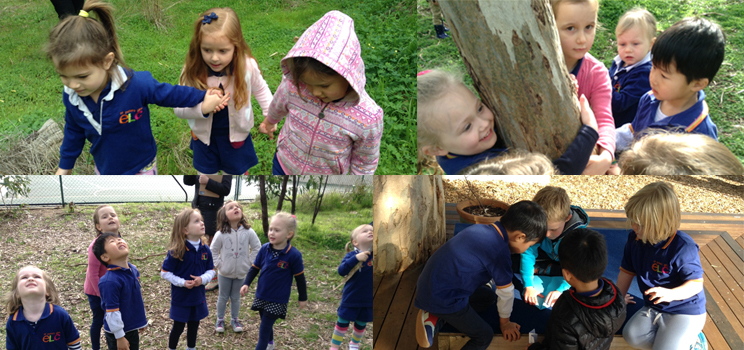
It is great to see our existing families return to the Hallett Room for Term 3 and we extend a special welcome to our new families.
At the end of last term, the educators came together to share recent inquiry investigations and where the children’s curiosities lay. It was evident that we were in an exciting place with our inquires and it was important that we continued to extend and build upon the children’s questions, wonderings and current investigations – rather than just stop because the term was coming to an end. We were keen to relaunch provocations from the end of last term and throughout Vacation Care, at the beginning of this term that would provide us with the opportunity to observe the children and their interactions with the world around them.
The children have not skipped a beat. As we see their happy, excited faces greeting us in the morning, the ease and success of the transition process is evident to see. The existing children have welcomed with joy the new friends as we begin our investigation into our Unit of Inquiry, ‘People can have an impact on our world’. From the provocations and clues that were carefully placed in the Hallett Room environment as ‘relaunches’ from our previous inquiries, the children have begun engaging with the following and sharing their questions and wonderings with confidence.
The worm farm: initiated during the Vacation Care program, the children are being encouraged to ask questions about the worms as we move towards an understanding about their role in the bigger picture of recycling and waste.
Ferguson Park: to continue with the strong connection children have with the park, we are inviting children to explore the area outside of the ELC.
Paper planes: coming from observations from Term 2 and Vacation Care, children have shared their skills with each other on their paper plane making. We are interested to see how this can springboard the understanding that action can have an impact on others.
We are excited to see where this leads and we invite you to listen carefully to what your children are sharing at home in relation to their experiences at the ELC and share with us your interactions, whether it be through an email or informal conversation. Have you noticed paper planes being made at home? Are your children asking about Ferguson Park or the Kaurna people? Please come and see the educators if you have any questions about the semester ahead. We are looking forward to this journey with your children.
Pam Reid
